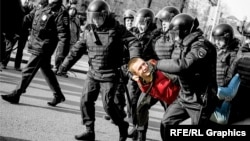Five years after the passing of the Russian “foreign agents” law in July 2012 and after the blacklisting of “undesirable” foreign organizations in 2015, there are few non-governmental organizations and independent media outlets in Russia that receive foreign grants and remain publicly active. Those that still do are not involved in elections such as the forthcoming 2018 presidential ballot. At least 95 groups have been placed on the Ministry of Justice’s “foreign agent” list that caused many to close due to the threat of fines.
In the last decade, major sources of funding for the Russian NGO sector have been forced to leave Russia due to the hostile climate. The Open Society Foundation, funded by billionaire philanthropist George Soros, closed its Moscow office in 2003 and was declared “undesirable” by the Prosecutor General in 2015. The British government was falsely claimed to have turned Russian activists into spies in 2006 and was forced to curtail its programs. The Ford Foundation decided to leave in 2009. USAID was expelled in 2012 by the Kremlin, which claimed the United States had “funded the opposition” although no evidence was provided. The MacArthur Foundation left in 2015. Even the UN Office of the High Commissioner for Human Rights was compelled to depart last year.
As with Ukraine, in making the “Western-sponsored color revolutions” claim, Russian officials and media point to a statement made by Victoria Nuland, then Assistant Secretary of State for the Bureau Of European And Eurasian Affairs, at a hearing by the U.S. Senate Foreign Relation Committee on June 7, 2016. Nuland said the U.S. government, through the Department of State and other agencies and contractors, had allocated $100 million to cope with the profound challenge of Russian disinformation and propaganda. This was to cover the budget of foreign broadcasting. She said an additional $88 million went to support “civil society, independent media and training outside Russia for those who have fled.”
It is not clear how much of this budget might go to independent media inside Russia, but as Nuland pointed out at the hearing: “This pales in comparison to the $400 million that Russia is spending, and frankly, the levels we spent during the Cold War on these kinds of things, which were over a billion dollars a year."
It is also important to put this sort of U.S. funding into perspective. First, much of the expenditures on such programs go to U.S. implementers and their travel and conference-venue costs. U.S. funders also have real limitations set by regulations barring participation in elections overseas, analogous with the domestic tax law 501(c)(3). They support advocacy and monitoring, not street pickets or mass demonstrations, in order to maintain their status as educational organizations.
The Foundation for Anti-Corruption, founded by Russian anticorruption activist Aleksei Navalny and which recently organized mass protests across Russia, does not receive foreign funding, but relies instead on donations from individuals within Russia. This funding has continued despite the numerous criminal charges brought against Navalny, which his supporters and Kremlin critics says are Kremlin retaliation for his exposure of high-level corruption.
Heavy restrictions on the Internet in recent years mean that any independent media can face prosecution for libel for criticizing government officials; blocking by the state censor, or worse, physical reprisals against journalists and jailing on trumped-up charges or broad offenses such as “blasphemy.” Independent news outlets face difficulty getting advertising because of fear of reprisals.
Russian Internet penetration is more than 70 percent now. Of those who use the Internet, 56 percent get their news online as opposed to state TV. Yet one study shows that only 13 percent of readers share links to independent media. and only 40% of frequent readers – themselves only 8.8 percent of total readership – look for “more ideologically diverse” sources.
Thus, even if the West spends millions on independent media or alternative broadcasting in Russia, there’s a limit as to how much it can penetrate the state-dominated media market such as to theoretically influence elections.
As Polygraph.info has reported, Russian officials have made similar claims in the past, including accusing the U.S. ambassador of scouting "social unrest potential" in Russian provinces and that U.S. diplomats have dressed up "in disguise" to take part in anti-government demonstrations.
The Kremlin is determined to make it appear as if protest can only be imported from abroad, although its policies engender criticism on their own without foreign prompting.




